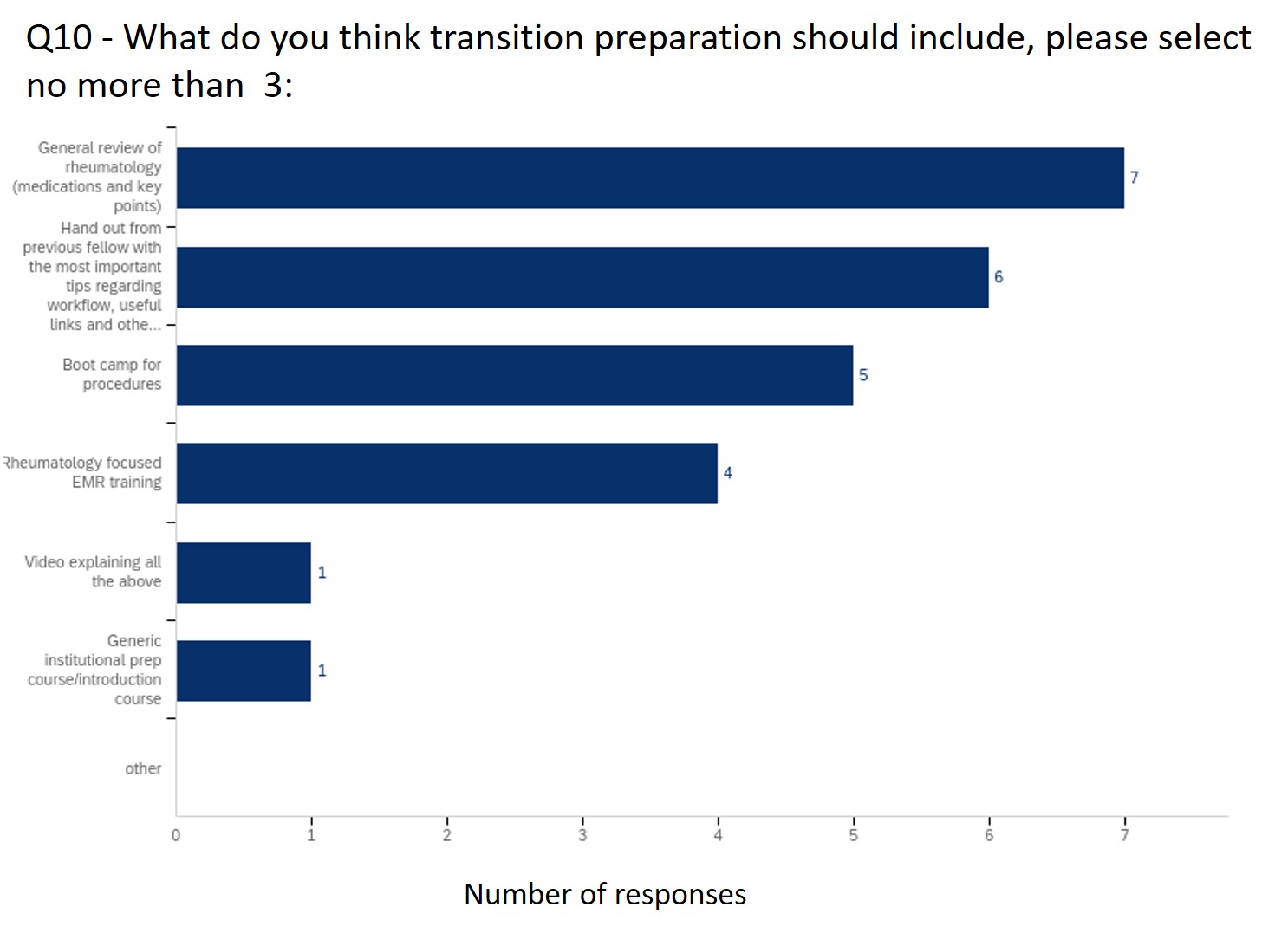Session Information
Session Type: Poster Session C
Session Time: 9:00AM-11:00AM
Background/Purpose: Transitioning from residency to fellowship is a significant milestone in a medical professional’s career. Physicians acquire foundational knowledge and skills during residency, while fellowship allows physicians to gain advanced expertise and specialized training in a specific area of medicine. This transition can be exciting and challenging, as fellows must adapt to a new learning environment, work with different colleagues, and take on greater responsibility in patient care. Nonetheless, with the right mindset, resources, and support, the transition from residency to fellowship can be a rewarding and fulfilling experience that prepares physicians for a successful medical career. This project assesses the transition process from internal medicine residence to rheumatology fellowship.
Methods: A cross-sectional survey of rheumatology fellows in Florida in April 2022 was conducted. We used a voluntary, brief, anonymous Qualtrics questionnaire to assess the transition from internal medicine residence to Rheumatology Fellowship. The survey was sent to 28 fellows. The survey assessed their perception of the transition process, including the level of preparedness, challenges encountered during the transition, and satisfaction with the support provided during the transition process, including mentorship, orientation, and institutional resources.
Results: A total of 12 fellows completed the survey, with a response rate of 43%. Age range was: 33.33%: 25-30 years, 50%: 30-35 years, and 16.67% >35 years, 91.67% were female, 33.33% were PYG 4, 50% PGY 5, and 16.67% PGY6. The majority of respondents reported feeling adequately prepared for fellowship. 41.67% (n=5) responded that the transition process from residence to fellowship was good, 25% excellent, 8.3% average, and 24% poor. 50% of responders did not participate in a generic institutional preparation course or specialty fellow preparation course. Most of the fellowship introductions lasted less than one week (72.73%). Fellows considered that the most important skill to learn before beginning the fellowship was EMR training (30%), followed by medical knowledge (basic rheumatology review) (25%), injections, and documentation skills. Regarding specific questions about EMR training, the most voted option was how to place orders (36.36%) and access to templates in rheumatology (27.27%). Most residents (29.17%) responded that transition preparation should include a general review of rheumatology, handouts from previous fellows (25%), boot camp for procedures (20.8,3%) and rheumatology-focused EMR training 16.67%.
Conclusion: Although most respondents reported being satisfied with the support provided during the transition, there are some areas of improvement during the transition process, especially in EMR training. These findings highlight the need for ongoing evaluation and improvement of the transition process from residency to fellowship. Targeted interventions, such as EMR training, general rheumatology and procedures boot camps, and handouts from previous fellows with important tips may help improve the transition experience’s quality and better prepare residents for success in their fellowship programs.
To cite this abstract in AMA style:
Otalora Rojas L, S Kaeley G. Navigating the Residency-to-Fellowship Transition in Rheumatology [abstract]. Arthritis Rheumatol. 2023; 75 (suppl 9). https://acrabstracts.org/abstract/navigating-the-residency-to-fellowship-transition-in-rheumatology/. Accessed .« Back to ACR Convergence 2023
ACR Meeting Abstracts - https://acrabstracts.org/abstract/navigating-the-residency-to-fellowship-transition-in-rheumatology/



